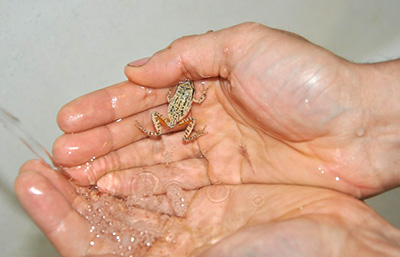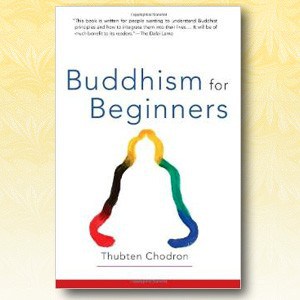Benefitting animals with wisdom and compassion
Animal liberation is a wonderful Dharma practice when done with a compassionate motivation and in a wise manner. The purpose is to save the lives of animals or insects who are about to be killed. By doing so, we create merit that we can dedicate to the awakening of all living beings.
Nowadays, some distortions in this practice have occurred. For example, some people deliberately catch fish, birds, and other creatures for Buddhists to buy and liberate. This is not animal liberation, for these animals were not going to be killed and we are not saving their lives. We practice animal liberation with beings who are otherwise going to lose their lives.
Ways to truly benefit animals
In addition, when we liberate animals, we must put them in an environment where they will be safe and where they will not damage other living beings in that area. Thus, before freeing animals, we must know their natural habitat and place them there. Otherwise we could make the delicate ecological balance of an area go askew, resulting in the deaths of many other living beings. This is counter to our motivation to save life.
Animal liberation also includes removing insects from your home without killing them, covering buckets of water left outdoors so that insects do not drown in them, and helping to find homes for stray dogs, cats, puppies, and kittens so that they are not euthanized.
Animals benefit greatly when we recite Dharma texts, prayers, and mantras so that they hear them. You can recite your daily practices with your pets in the room, whisper a few mantras when you pet dogs in the park, and chant mantra out loud when you walk in nature or work in your garden. Doing so puts good imprints on the mindstreams of the animals and insects in the environment. These imprints will ripen in their future lives and enable them to make a Dharma connection.
A letter from a friend
Recently, a friend of a friend, from Singapore, wrote me about the practice of animal liberation. What follows are excerpts from her letter:
About twenty years ago, as someone who had just turned vegetarian and awakening to animal cruelty, I occasionally bought captive birds, brought them home and released them. It felt good and I thought I was being compassionate. Only years later did I realize that it may have harmed the birds and the environment they were released into.
The intention of releasing animals into the wild is very positive. But the impact is being shown to be negative to the animals as well as environments they are being released into, and to the other animals in them. I am so grateful that the American Buddhist Confederation, together with Humane Society International, discourages this practice.
Consider the potential effects
I have spent almost two decades working for the welfare of animals in various ways. I have asked myself why my mind has been focused on this particular issue in the last few years. These are the reasons:
Save animals and the environment
Animal groups such as the Environment and Animal Society of Taiwan and Humane Society International have documented the suffering that captured and released animals undergo. Conservation groups have documented damage done to the environment. More information can be found here:
An end to this practice will stop this cycle. It will not stop animals from being caught for consumption but there are more direct and resource-efficient ways to stop that, such as going vegetarian, supporting vegetarian groups etc.
Support right livelihood
Some businesses make their living by catching animals from the wild or breeding them in captivity. This results in immense animal suffering. When people buy these animals, they are directly supporting these trades, encouraging them to continue. Sometimes the very animals that are released may be caught again and again, if they survive. As consumers, we have the choice to support compassionate businesses and charities which are actively doing good in the world. Given the amount of money spent on animal release, this translates to a lot of other more positive uses for that money.
Alternatives
Here are some alternatives that could replace animal release:
Visit an animal shelter or animal rehabilitation center and support their work.
Take part in animal release programs that are carefully managed by animal protection or conservation groups.
Make lifestyle changes. Eat less meat or become vegetarian. Use products not tested on animals or which don’t have animal parts, choose entertainment that is animal-cruelty free, choose clothes that aren’t made from animal skins, etc.
I hope that more Buddhist leaders like you could lend support to efforts to replace the practice of animal release with powerful alternative actions that can help many lives through compassion, wisdom and truth.
With Gratitude, Anonymous
This article is available in Spanish: Beneficiar a los animales con sabiduría y compasión.
Watch a Bodhisattva’s Breakfast Corner talk on this topic:
Venerable Thubten Chodron
Venerable Chodron emphasizes the practical application of Buddha’s teachings in our daily lives and is especially skilled at explaining them in ways easily understood and practiced by Westerners. She is well known for her warm, humorous, and lucid teachings. She was ordained as a Buddhist nun in 1977 by Kyabje Ling Rinpoche in Dharamsala, India, and in 1986 she received bhikshuni (full) ordination in Taiwan. Read her full bio.



